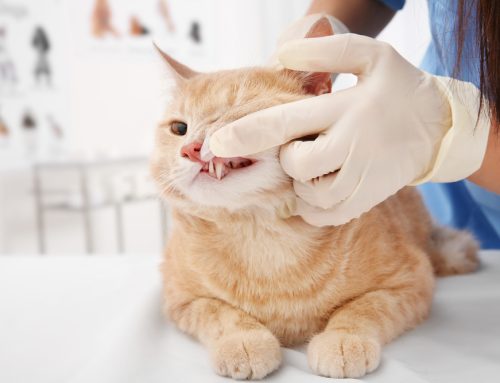Most pets are diagnosed with periodontal disease at some point in their life. Dental disease often goes unnoticed, but remains a prevalent condition that causes pets to suffer. Periodontitis is a progressive condition that harms the teeth’s supportive structures, including the gums and bone. While these facts seem bleak, dental disease is preventable. Our Lebanon Animal Hospital team describes periodontal disease causes and signs, and explains how you can prevent your pet from developing this condition.
Periodontal disease in pets
Many factors increase pets’ dental disease risk such as age, health, and breed. Small dogs are often diagnosed with periodontitis because their mouths are small, which causes tooth overcrowding. Older dogs’ and cats’ teeth have been subject to years of wear and tear, and some of these seniors have never had professional dental cleanings or other interventions. Aside from these factors, a pet of any age and size can develop dental disease.
Periodontitis begins when plaque mineralizes and hardens into tartar (i.e., calculus), and bacteria erode teeth’s supportive structures. Gumline pockets accumulate bacteria, which lead to infections and abscesses. Over time, tooth structures erode, causing a pet to lose teeth and bone, and experience pain and further infection. Oral bacteria can also spread into the bloodstream, damaging the heart, liver, and kidneys, creating secondary, sometimes life-threatening, conditions.
Signs of dental disease in dogs and cats
Since your pet can’t tell you they’re in pain or have dental problems, you need to learn to recognize periodontal disease signs. What can sometimes be written off as being insignificant, such as foul breath, can alert you to changes in your fur pal’s health. Your pet may have periodontal disease if they have these signs:
- Halitosis (i.e., bad breath)
- Swollen gums
- Red gums
- Difficulty chewing or favoring one side to chew
- Pawing at the mouth
- Bleeding from the gums
- Behavior changes (e.g., hiding, lethargy)
- Loose or missing teeth
If your pet exhibits any of these periodontal disease signs, contact our Lebanon Animal Hospital team. We will thoroughly examine your pet, including their mouth, to diagnose their dental disease’s cause and establish a treatment plan that offers them the best chances of good oral and overall health. The sooner we begin your pet’s treatment, the better their prognosis.
Treating periodontal disease in pets
Like all health conditions, dental disease is staged from mild to advanced or severe. Some pets require tooth extractions, while others can be treated through a professional dental cleaning. No matter the stage of your pet’s dental disease, when you initiate your furry pal’s oral hygiene routine, you make a positive impact.
During your pet’s dental exam, our Lebanon Animal Hospital team assesses your furry pal’s teeth and gums, looking for decay and gingivitis signs. We also clean their teeth and take digital full-mouth X-rays. These X-rays are immeasurably useful in seeing below the gumline, where infection and bone loss may be hiding. If we conclude your pet has periodontitis, we stage their condition:
- Stage 1: Gingivitis
- Stage 2: Early periodontitis
- Stage 3: Moderate periodontitis
- Stage 4: Advanced or severe
Depending on the stage of your pet’s periodontal disease, we establish a treatment plan to bring their teeth and gums back to health. Stages 1 and 2 are ideal for treating a pet through dental cleanings, including scaling and tooth polishing. If we stage your pet’s periodontal disease as being a 3 or 4, your furry pal likely needs tooth extractions, antibiotics to treat infections or abscesses, and other veterinary dentistry treatment modalities to prevent their condition from progressing.
Keep your pet’s smile healthy and bright

Periodontal disease is a common but preventable condition in pets. By understanding the disease’s causes, recognizing the signs, and implementing preventive measures, you contribute to your furry friend’s overall health and well-being. Prevention relies on regular at-home and professional dental care, such as daily toothbrushing and wellness exams.
If you need a pet toothbrushing demonstration, we’re here for you. We can teach you the best methods of how to brush your four-legged friend’s teeth effectively. Routine at-home and professional dental care is an investment in your pet’s health, ensuring they maintain their sweet smile and have a happy, pain-free life. Schedule your pet’s wellness exam and dental assessment with our Lebanon Animal Hospital team.








Leave A Comment